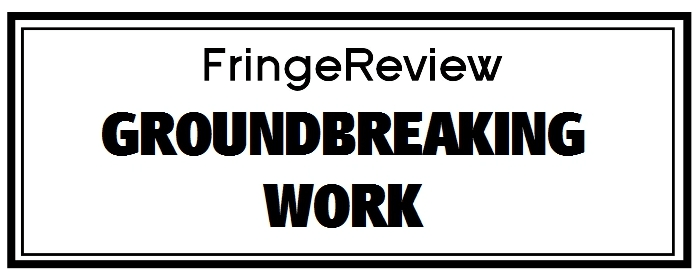FringeReview UK 2019
seven methods of killing kylie jenner
Royal Court Theatre

Genre: Contemporary, Dark Comedy, Drama, Experimental, Feminist Theatre, LGBTQ, Mainstream Theatre, New Writing, Political, Short Plays, Theatre
Venue: Royal Court Jerwood Theatre Upstairs
Festival: FringeReview UK
Low Down
Directed by Milli Bhatia. In Rajha Shakiry’s traverse design there’s an overhanging set with ropes (invoking strange fruit) and hemp-like material like a cloud lit up differently by Jessica Hung Han Yun. Elena Pena’s sound design punctuates the messaging. Movement by Delphine Gaborit finds its joy in those same interludes. Till July 27th.
Review
From blackout there’s a glimmer as two figures drag a body to an open ghoulishly lit grave. Gothic maybe but digital fantasy defo. Cleo’s obsessed with the titular character, and in Jasmine Lee-Jones seven methods of killing kylie jenner works out what ‘kill’ means which isn’t always as here, literal.
This play has the most thrillingly original language of any Royal Court work since Vivienne Franzmann’s 2014 Pests; but it’s meta-textual too, illustrated with tweets of varying sizes and with a wild typographical layout often in colour that dazzles.
Danielle Vitalis’ Cleo is a super-articulate student creating meta-languages from the twitttersphere and acronyms, even when to say RL uses the same syllables as Real Life. Its not just the digitalised text-world as speech, it’s a universe she shares with Tia Bannon’s Kara.
Cleo’s obsessed with Jenner. As Incognegro she quips ‘YT woman born into rich American family, somehow against all odds manages to get more rich…’ That’s annoying. ‘Self-made? That bitch is about as self-made as my bed.’ There’s greater rage though in this tale of counter-cultural-appropriation and a comeback for Jenner who’s made so much from being objectified, she’s weaponized it – and Cleo concludes turned it on black women. Now Jenner’s being challenged as an object herself.
Cleo seethes: ‘But when MAC Instagrammed a picture of a black model with lips of the same width she was called ugly.’ It’s time to act.
The Royal Court Upstairs has recently proved under Vicky Featherstone a kiln of experiment and expression for plays by women of colour. It’s exhilarating; long may it continue.
Seven method’s directed by Milli Bhatia. In Rajha Shakiry’s traverse design there’s an overhanging set with ropes (invoking strange fruit) and hemp-like material like a cloud lit up differently by Jessica Hung Han Yun, evoking the membrane-like set of Stoppard’s The Hard Problem. As the twittersphere itself it comes alive in babel interludes as a menace of communication – and opportunity.
The stage enfolds wooden platforms with a cellar-like opening trap-door that gapes as a grave. Elena Pena’s sound design punctuates the messaging with bursts of digital reality. Movement by Delphine Gaborit finds its joy in those same interludes; where this play comes alive with a verbal/visual density that’s the most exultant I’ve seen this year.
Vitalis and Bannon act out the alternate reality as Kara challenges Cleo’s seven deadly methods. In between they enact reverse cultural appropriation in wild expressive moves interspersed at one point with monkey impressions enacted from the racist tweets Cleo’s been getting like acid reflux.
There’s a narrative point to this that comes as an epilogue, though the structuring of the play and its modes of crisis aren’t yet the equal of Lee-Jones’ linguistic and experimental brilliance. It hardly matters. In 80 minutes you won’t even breathe.
What Lee-Jones captures more thrillingly than any other new dramatist is the sheer compression of a private hard language digitally-based but personalised, one that spins out of coherence of some but which is easily grasped in all its acronyms. But the modes of deconstructing, dismembering kj – as Jenner isn’t quite called – are overlain with Cleo’s suddenly very different hyper-articulate slabs of academic jargon. This irritates the ST out of Kara but tends to Cleo’s project.
Kara herself objects to such comments as her girlfriends being referred to as ‘what bitch’ and turns tables on virtue-signalling Cleo who as woman of deeper colour – it’s an important dynamic – feels the more oppressed. Kara’s answer in Bannon’s increasingly testy sallies is to challenge Cleo’s own cultural appropriations, gender and sexual assumptions.
Cleo though has to face that glimmering twitterstorm and can she rely on Kara? As the play deepens we’re introduced to a final cultural narrative, but only after we’re right back where we started; except now we understand it.
As Cleo and Kara look slowly round with the lights on Cleo asks: ‘They’re just sat there, not saying anything… What are you gonna do now…. clap?’ Yes, standing.


















































